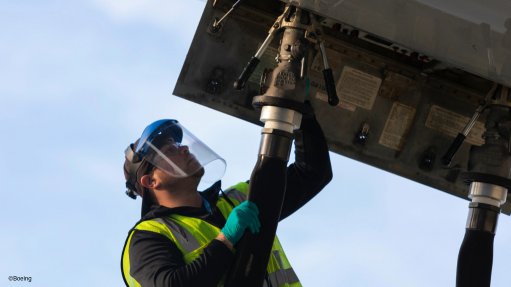Reducing costs in the oil and gas industry: how mechanical pipe systems can help oil companies streamline operations
This article has been supplied as a media statement and is not written by Creamer Media. It may be available only for a limited time on this website.
Arrie Nel, Territory Manager at Victaulic
PwC’s “Africa Oil and Gas Review” for 2017, which was released in November, highlights how the global industry is still adjusting to the realities of a $50 to $60 per barrel oil price landscape. On the continent, other challenges that are specific to the region and the market have been relatively consistent over the past decade, and include regulatory issues, corruption and financing costs.
Additionally, a top priority for oil companies in Africa is the issue of costs. With the oil price staying low, cost cutting has become a key focus and streamlining operations is even more of a business imperative. In fact, PwC’s study reveals that operational excellence has been the top strategic focus area identified by respondents since 2014. The PwC report notes that innovative technologies are particularly important in this regard.
With oil companies depending considerably on piping systems as a vital part of their business, one such solution to lowering costs and streamlining operations is mechanical pipe joining systems, which offer an alternative to the use of flanges or welding to connect piping systems. Globally this technology is one of the most popular and trusted methods of securing pipes, but Africa has been slow to catch on.
Easier logistics and quicker installation
Oil facilities are often located in remote areas, so lack of reliable infrastructure can present a challenge. When installing and maintaining a welded piping system, a considerable amount of heavy equipment is needed, which must be transported to the oil facility. Mechanical pipe joining systems like those of Victaulic, however, require very little equipment, which makes conveyance to the site far easier.
Installation is also much quicker – up to five times faster than traditional welded systems. In addition, Victaulic pipe joining technology can easily accommodate changes in the scope of the project, as the pipes can be taken apart and the same parts can be reassembled with ease. Mechanical pipe joining systems also require far fewer workers and less skilled workers, unlike welded piping where qualified welders are crucial to the installation process. Because there are relatively few of these artisans on the continent, they are in high demand, which makes welding labour costs very expensive.
In addition, mechanical joints only require visual inspection to ensure a proper joint, whereas welded joints require costly x-ray tests. Should any joints fail, they need to be cut, welded and x-rayed all over again.
Simpler to maintain and tamper-proof
Another advantage of using mechanical pipe joining systems for oil facilities is simpler maintenance. Victaulic makes use of a union at every joint, providing easy access for maintenance and system expansions. In fact, maintaining a mechanical pipe joining system can be up to ten times faster than maintenance of a welded system. Much less oil is also lost in the process. Both of these aspects are critical to oil companies achieving more effective operations, and once again less skilled labour is required.
Maintenance is also a lot safer and simpler with mechanical pipe joining systems, as there is no fire risk, and so health and safety hazards on the job site are drastically reduced. You also need fewer people working on site for a shorter period of time, which in itself reduces health and safety risks.
There is a perception in the oil industry that mechanical pipe joining technology can make the pipes more vulnerable to oil theft and tampering, believing that the joints are sites of weakness. However, this is not the case. Victaulic produces tamper-proof couplings in which the bolts and nuts are hidden and not easily accessible to untrained persons, making tampering and removal of the couplings prohibitively difficult.
Getting the most out of an oil facility with a short lifecycle
One recent Victaulic project involved the Remboue Oil Production Facility, which is located on a remote island two hours off the coast of Gabon, Ghana. The facility produces 10,000 barrels of oil per day and consists of a crude oil header, three phase separator, pumping station and tanks.
Because the plant had a lifecycle of only two years and would then be moved to another location, getting the facility online quickly so production could start was critical. It was for this reason that Victaulic grooved mechanical products were chosen over traditional welding or flange pipe joining methods. Because of the ease and speed of the pipe system installation, an impressive six months was shaved off the plant’s installation and commissioning schedule, reducing the overall project time from 18 months to just 12 months.
Comments
Announcements
What's On
Subscribe to improve your user experience...
Option 1 (equivalent of R125 a month):
Receive a weekly copy of Creamer Media's Engineering News & Mining Weekly magazine
(print copy for those in South Africa and e-magazine for those outside of South Africa)
Receive daily email newsletters
Access to full search results
Access archive of magazine back copies
Access to Projects in Progress
Access to ONE Research Report of your choice in PDF format
Option 2 (equivalent of R375 a month):
All benefits from Option 1
PLUS
Access to Creamer Media's Research Channel Africa for ALL Research Reports, in PDF format, on various industrial and mining sectors
including Electricity; Water; Energy Transition; Hydrogen; Roads, Rail and Ports; Coal; Gold; Platinum; Battery Metals; etc.
Already a subscriber?
Forgotten your password?
Receive weekly copy of Creamer Media's Engineering News & Mining Weekly magazine (print copy for those in South Africa and e-magazine for those outside of South Africa)
➕
Recieve daily email newsletters
➕
Access to full search results
➕
Access archive of magazine back copies
➕
Access to Projects in Progress
➕
Access to ONE Research Report of your choice in PDF format
RESEARCH CHANNEL AFRICA
R4500 (equivalent of R375 a month)
SUBSCRIBEAll benefits from Option 1
➕
Access to Creamer Media's Research Channel Africa for ALL Research Reports on various industrial and mining sectors, in PDF format, including on:
Electricity
➕
Water
➕
Energy Transition
➕
Hydrogen
➕
Roads, Rail and Ports
➕
Coal
➕
Gold
➕
Platinum
➕
Battery Metals
➕
etc.
Receive all benefits from Option 1 or Option 2 delivered to numerous people at your company
➕
Multiple User names and Passwords for simultaneous log-ins
➕
Intranet integration access to all in your organisation


















